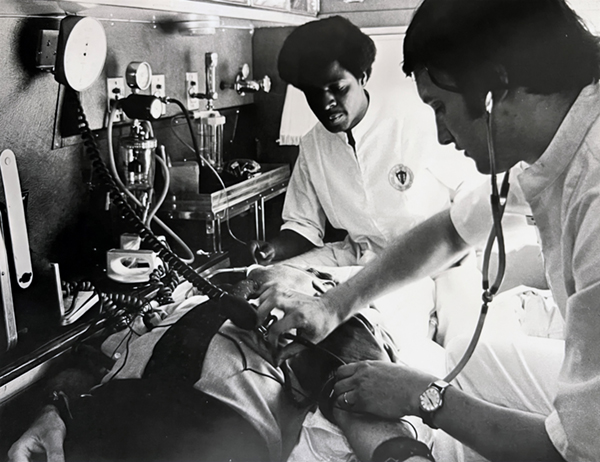USW members learn from EMT pioneer during Black History Month webinar
John Moon was responsible for many “firsts” of ambulatory care, including being the first Emergency Medical Technician (EMT) to intubate a person in the field. He and his co-workers accomplished this and much more while serving with the Freedom House Ambulance Service, the first emergency medical service in the United States to be staffed by paramedics with medical training beyond basic first aid.
USW members had the chance to hear directly from Moon on Tues., Feb. 21, during a special Black History Month “Teaching Tuesday” organized by the USW Health Care Workers Council and the Education and Membership Development department.
The webinar featured a screening of the WQED documentary “Freedom House Ambulance: The First Responders,” produced by Annette Banks, who also joined the evening’s discussion.
Moon expressed his gratitude for being able to participate in the film and keep the legacy of Freedom House alive.
“I am still in awe of how so far ahead of our time we were during that era,” said Moon. “It really makes my heart smile. I’m emotional about it even now.”
Founded in 1967 to serve the predominantly Black residents of the Hill District in Pittsburgh, Pennsylvania, the majority of Freedom House staff were Black workers. The ambulance service broke medical ground by training its personnel in previously unheard-of standards of emergency medical care for patients en route to hospitals.
Despite their immaculate record, Freedom House Ambulance Service’s request to expand their contract with the city to cover additional parts of Pittsburgh was denied by Mayor Peter Flaherty.
In 1974, the mayor announced plans for a citywide ambulance system to be staffed by police officers trained as paramedics. At the end of the year, he then announced the creation of a citywide ambulance service to be staffed by non-police paramedics and the end of the contract with Freedom House.
Moon was one of the few Black EMTs who joined the city’s ambulatory service, as many were pushed out, and he experienced discrimination daily on the job.

“I had to step up my game and make sure I was not systematically eliminated,” said Moon, who retired in 2009 as assistant chief of Pittsburgh’s EMS. “We weren’t wanted there.”
Amber Stoer, who works as an EMT in California and serves as recording secretary of USW Local 12911, also joined the webinar and spoke on her own experiences facing systemic barriers in the field. She said being a woman in EMS comes with extra challenges, from workplace discrimination to difficulties with returning to work after having a child.
“When I first started, I had a manager tell me I wouldn’t go anywhere,” said Stoer. “I told him that eventually, workers would come to me for help before they came to him, and that’s exactly what happened.”
Stoer also noted that when she took her first EMT training 14 years ago, she learned about the history of the field, including the pioneers of Freedom House.
“It’s really empowering to come full circle and be able to hear from you like this,” she told Moon. “This is all really inspiring.”
USW Vice President at Large Roxanne Brown also helped moderate the evening’s panel and ended the conversation with a look toward the future and a nod to Moon’s historical, community-based work during a time of severe inequality and police brutality.
“It gives me hope to listen to what you’re saying because the same genius you all displayed that derived from need is the same kind of genius that I hope will strike today in the communities all across the country that are still in disrepair and in need of resources,” said Brown.
Click here to learn more and watch the 30-minute documentary about Freedom House.
By clicking Sign Up you're confirming that you agree with our Terms and Conditions.
Recent News Articles
Want to Learn More?
See how the USW is making a real difference in our communities and our workplaces.

